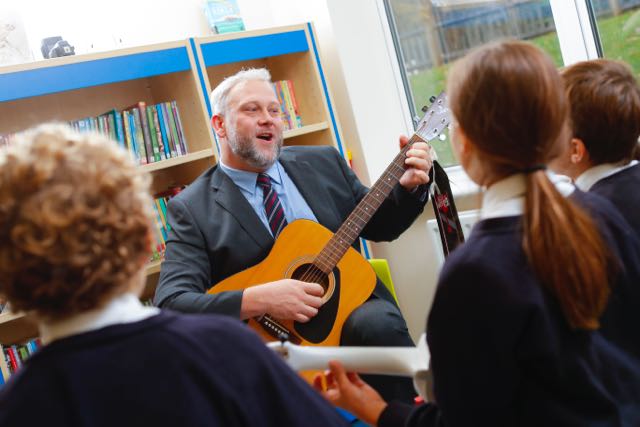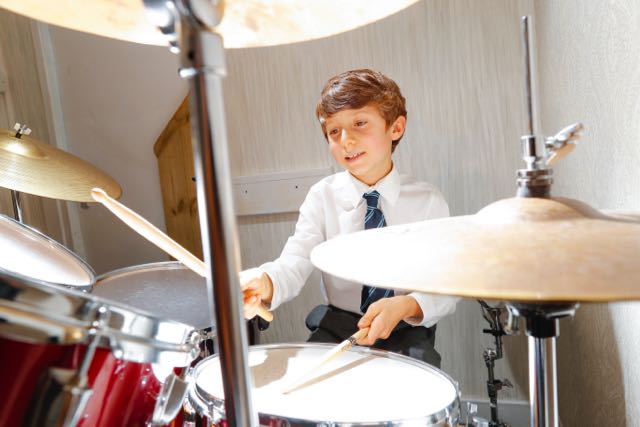When Haslemere's children's centre was closed down, St Bartholomew's Primary was left with a vacant building. Headteacher Charles Beckerson explains how they came up with an exciting new initiative that’s benefited both the school and local community.

Back in 2010, St Bartholomew's Primary School agreed agreed to host a Sure Start children’s centre for the community on our school site. We had this centre for 10 years, however, due to issues with budgets, the LA took the decision to close many of its centres, and ours was one of the centres to close. This left us with an empty building that needed to be used for some sort of educational purpose as it had been funded by the DfE.
Ofsted is currently making it very clear that schools should be providing a rich, dynamic curriculum that’s not just focused on English and maths. It’s encouraging children to develop new learning and high quality skills in all subjects, and we thought that this was a great opportunity to do something creative with that building.
We need to widen the curriculum to allow young people to find their own talents, find themselves and see how they fit into the world
Being a keen musician, I really do see the benefits of music in people’s lives, and it’s been upsetting for me seeing subjects like music being squeezed out of the curriculum in primary schools during the last 20 years.
I’d previously had conversations with Andy Hart, the founder of the not-for-profit music school the Music Works, about creating a space in our school for music lessons. Once the building was free, I suggested to him that we could create an entire music school.
Now, during the day the building is used by the school, and then on weekday evenings and between 10-2pm on Saturdays, it’s open to the general public.
Want to keep making music in lockdown? Check out The Music Works YouTube channel for some lockdown funk, or watch Charles demonstrating how to record using GarageBand. Or how about making your own pentatonic bottle xylophone at home?
Not only is this an amazing resource for our community in that it brings music into so many people’s lives, but after the Music Works have paid their teachers and made sure their resources are kept up to a standard, the leftover profits go to our school.
No not at all, quite the opposite.
I think the challenge was the disappointment in the community that the children’s centre was being closed. Having been able to go back and offer something exciting and relevant in our children’s lives (and not just children, adults too!) and to be able to say here is a new community resource, it’s actually just made people very excited.
It benefits the school in a number of ways.
Where we can, we also offer free lessons to parents/carers who can’t afford to pay for their children. This means we’re able to offer music teaching to a lot of disadvantaged children who would otherwise not have been able to have this.
I think that music is a really important part of culture. When families visit big cities like London, for example, they’ll be going to the theatre, to an art gallery, to a museum etc., but they’re not very likely to go up there to do writing or maths.
I think if we don’t have music in our education system then we’re going to have a growing smaller percentage of musicians coming out of our country.
Living in a world with such a narrow curriculum also narrows expectations of what we need to be doing and achieving. We need to widen that and allow young people to find their own talents, find themselves and see how they fit into the world.
I don’t think it’s right for all schools in the country to be the same as each other. You need to decide what is needed in your school or community, and do what’s right for your children and young people
Giving young people the opportunity to play and study music provides them with the opportunity do to that. It’s the same as sport and art. We’re not all going to be footballers or guitarists but we need to be offering these opportunities so children can find out what they can do.
Music also provides people with relaxation, enjoyment and opportunities to be social, and there's quite a lot of evidence to suggest that studying music can actually help the brain to develop so that it supports other ways of learning, particularly mathematics.

It’s a career highlight for me to do this as a headteacher. To bring something that I’m so passionate about into the school and community and see it so positively received by others, I feel that I’m really doing my bit for our country and our culture.
If other schools can find their strengths and do the same thing, then we’ll see a much more positive outlook for children coming out the other end of education and what they’ve got to offer to the world.
Excellence in Pupil Development Award (EPDA)
Want to put pupils' personal development at the heart of your school?
The EPDA offers a framework to evaluate and enrich your pastoral curriculum, giving your school the opportunity to set high expectations for pupil behaviour, promote positive attitudes towards learning and the wider community and engage with external organisations to help raise pupils' aspirations for their behaviour.
Find out more at oego.co/OE-EPDA